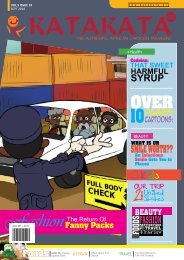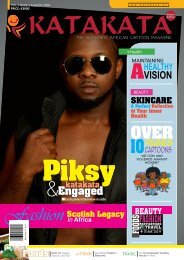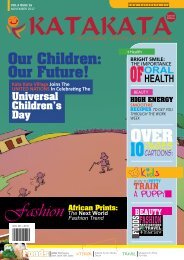KATA KATA magazine vol 8 issue 30.pdf(digital)
- CARTOON: Enough of Female Genital Mutilation - LITERARY: Amanda Gorman’s poem "The Hill We Climb": The Issues of translation, & fragmentation & Identity - HEALTH: Twelve Anti-ageing foods - FASHION: Ten commandments of men’s wear - INTERIOR: Trending paint colours - BEAUTY: Sunscreen products - TECHNOLOGY: Pros and cons of PayPal - LITERARY CORNER: Movies, Poems & Books - KIDs: Binoculars for kids - TRAVEL: Safest Countries In Africa In 2021 - FOOD: Sudanese traditional cuisines - LETTER: Dear Aunt Silvia
- CARTOON: Enough of Female Genital Mutilation
- LITERARY: Amanda Gorman’s poem "The Hill We Climb": The Issues of translation, &
fragmentation & Identity
- HEALTH: Twelve Anti-ageing foods
- FASHION: Ten commandments of men’s wear
- INTERIOR: Trending paint colours
- BEAUTY: Sunscreen products
- TECHNOLOGY: Pros and cons of PayPal
- LITERARY CORNER: Movies, Poems & Books
- KIDs: Binoculars for kids
- TRAVEL: Safest Countries In Africa In 2021
- FOOD: Sudanese traditional cuisines
- LETTER: Dear Aunt Silvia
You also want an ePaper? Increase the reach of your titles
YUMPU automatically turns print PDFs into web optimized ePapers that Google loves.
You would expect such commotion and resistance in the USA alone, but here in my country, the
Netherlands, a similar debate was/is going on. A typical case in point was the brouhaha
that followed the Meulenhoff Publishers’ choice of Marieke Lucas Rijneveld, a white
Dutch novelist, as a translator of Amanda Gorman’s poem “The Hill We Climb,” into
Dutch. Following the public debate over the choice of Marieke Lucas Rijneveld rather
than someone closer to the Gorman, in both origin and genre, Marieke Lucas Rijneveld
had to withdraw, only to be replaced by a black spoken word artist Zaire Krieger, as the
translator. Marieke Lucas Rijneveld (white) controversial replacement with Zaire Krieger
(black) raises many questions, including, but not limited to the following: What is identity?
How multiple can identity be? Can someone from a different social group understand the
experience of those from another group? Is one’s expertise in a given field of study
limited to works related to their social group? In other words, can, for example, a
literary critic from a particular social background interpret an academic assignment
written by someone from another social group?
We cannot say that one has a pregiven,
constant, fixed or static identity because
the meanings of identity depend on
their constructions in specific contexts.
Instead, we have multiple identities,
which are meaningful only as a member
of a group. In other words, each
individual makes meaning as a member
of a community or group; we do not
create meanings individually because
one’s identity is derived from a larger
community, which one belongs to.
That multiplicity of identity gives rise to
fragmentation. What does one’s identity
as a woman mean? Generally, one could
classify women as a minority, but that
classification depends on many factors
such as the woman’s community, race,
education, religion (you name them).
For example, a black and white woman
from the USA may have a different level
of socialisation, power and authority
despite belonging to the same gender
group (woman). Generally, would one
expect a European woman working in
a bank to have the same social control,
power and access to (re)production of
meaning as her counterpart in a village
Identity
in Somalia? Hardly not. Social influence
and dominance are based on privileged
access to socially valued resources such
as education/knowledge, status, group
membership. Even though blacks in the USA
(and, for that matter, Amanda Gorman)
have less power and control than their white
counterparts in the USA, the former may still
generally enjoy a higher hierarchy and social
position than her “sister” in Afghanistan.
Coming from a different community (black/
white community) means different social
experiences – and fragmentation. Although
Amanda Gorman, Marieke Lucas Rijneveld
and Zaire Krieger are all women, they belong
to other social communities, which exposes
them to different experiences, despite having
the same gender. That makes one’s identity
(as a woman/man) multiple: women share
the same gender group, yet they are divided
according to their race, class, nationality,
education, levels of psychology, sexual
orientation etc. All these differences define
women hardly as “a unified sisterhood or
nature.” The multiplicity of identity means
the fragmentation of a group. As a black,
one could argue that Zaire Krieger may be
closer to Amanda Gorman in both origin and
experience. But how about the genre? That
brings one to the next question.
a different social group understand
Can someonefrom the experience of those from another group?
Zaire Krieger defended her choice to interpret Gorman’s poem with the following argument:
“For example, if Gorman had written a dystopian novel, it would have been very different. But Gorman’s poem is about a
black woman finally being allowed to take up space in the white system.”
2021 | Issue 8 Vol 30 | Kata Kata cartoon magazine 21
















